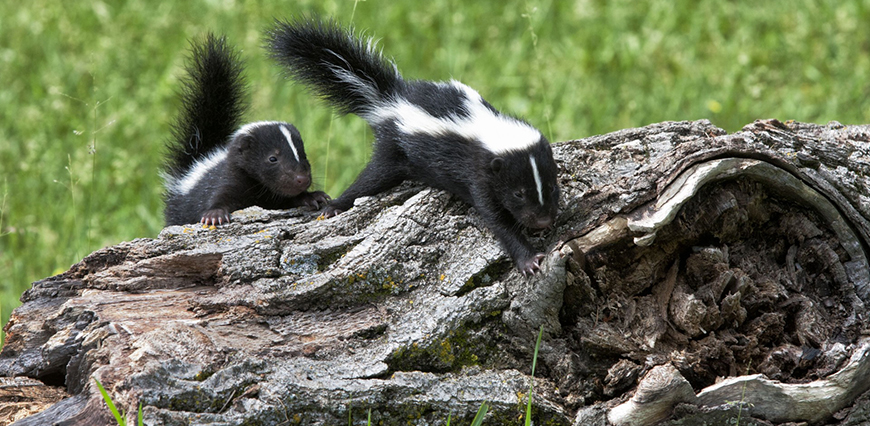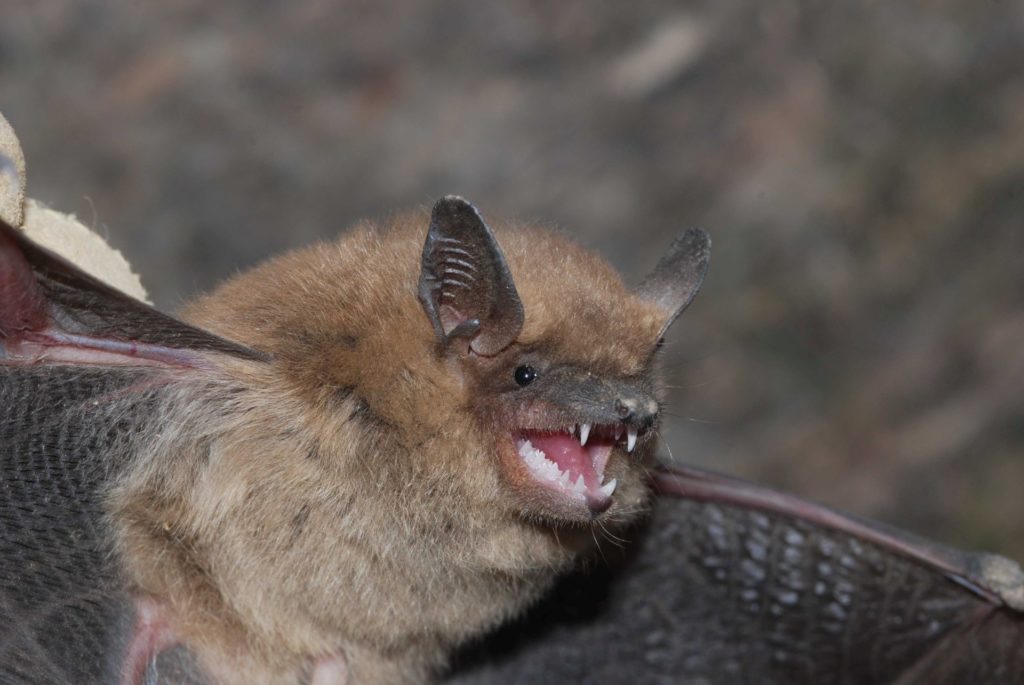
Above: Skunks are a concerning source of rabies in Colorado.
The warm months are a time to beware of rabies as an infectious disease that can threaten the health of people and their pets – a fact underscored in mid-May, when state health agencies reported that two dogs in Colorado had been diagnosed with rabies.
Rabies is a zoonotic disease, meaning it can be transferred from one animal species to another. It is triggered by a virus that infects the brain and, once acquired, is virtually always fatal.
The two cases reported in dogs are an important reminder that pets should always be vaccinated against rabies to prevent the disease; horse and livestock owners should discuss with their veterinarians whether vaccination is warranted.
Reports of rabies infection in wildlife hosts often rise sharply in the springtime, as these animals become increasingly active in places where we may easily observe and encounter them.
Primary hosts include bats and skunks

The main carriers of rabies in the United States are raccoons, skunks, bats, foxes and coyotes. These wild critters are well-established in rural and urban settings alike, and they often come into contact with people and pets. That makes rabies a public-health concern tracked by state and federal agencies.
Since 2007, Colorado has seen an uptick in wildlife testing positive for rabies. In 2016, 88 animals tested positive for rabies in Colorado, including 58 bats, 25 skunks and five other animals, according to the Colorado Department of Public Health and Environment.
Of these, 66 rabid animals were known or strongly suspected of exposing 113 domestic pets, 120 livestock animals, and 54 people to rabies. These numbers demonstrate how just a few infected wild animals can pose a serious health threat to a much larger group of people, livestock, and pets.
Skunks, in particular, have gained a high profile as a species that carries rabies in Colorado. In fact, from Jan. 1 to May 19 this year, the Colorado Department of Public Health and Environment has confirmed rabies in 38 skunks; that’s about 80 percent of the total confirmed cases of rabies in Colorado so far this year.
Why is rabies a big deal?
The rabies virus is shed in the saliva of an infected animal and usually is passed through bites and scratches. The virus then replicates and travels through the nerves to the brain.
Vaccination against rabies can prevent companion animals, such as dogs and cats, from contracting rabies from wildlife – and this is a critical way to avoid the spread of rabies to people.
The World Health Organization reports that an average of 60,000 people die from rabies each year, most in Africa and Asia, and that more than 15 million people receive post-exposure prophylaxis every year. Most human cases result from the bites of rabid dogs; children are most often at risk, according to the WHO.
Vaccinate – and beware of critters acting odd or sick
With rabies clearly present in wild animals across the state and nation, it is important that pet owners:
- Check vaccination records for their pets.
- Vaccinate any pets that lack current rabies vaccinations.
- Vaccinate horses and frequently handled livestock, such as 4-H and FFA animals.
- Keep pets away from wildlife, and keep dogs leashed during walks.
- Notice critters in the environment, and be especially watchful for animals that seem sick or act abnormally.
- Never approach or touch a wild animal that seems sick or acts strangely. Call a local animal control office immediately to report the time and location of such a sighting.
- Remember, it is abnormal to spot nocturnal animals, including bats and skunks, during the daytime; that can be a sign of infection.
- Talk to your veterinarian for more information.
For more information, visit:
Colorado State University Veterinary Extension (Navigate to “Rabies”)
CSU Veterinary Teaching Hospital: Rabies in horses and livestock
Colorado Department of Agriculture, State Veterinarian’s Office: Pet and livestock owners cautioned about rabid skunks
Colorado Department of Public Health and Environment: Rabies
Larimer County Department of Health and Environment
Dr. Ragan Adams, D.V.M., is a Veterinary Extension Specialist and senior research associate in the Department of Clinical Sciences at Colorado State University.